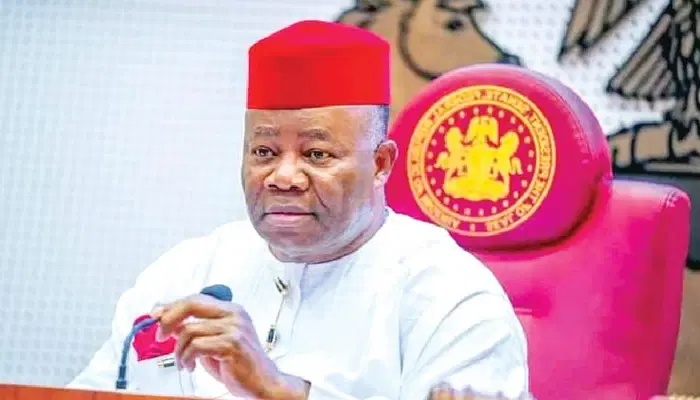Senate President Godswill Akpabio has drawn criticism from NLC, TUC, and NECA over controversial tax remarks.
Akpabio stated that only 30% of Nigerians pay taxes but expect improved infrastructure, education, and security services.
He made these remarks during a two-day Senate public hearing on proposed tax reform bills in Abuja.
Akpabio stressed that tax reforms represent Nigeria’s future and must be accurately structured for national economic growth.
However, NLC, TUC, and NECA argued tax evasion results from poor government accountability and fiscal mismanagement.
Tinubu Pushes for Workable Tax Laws
President Bola Tinubu urged the Senate to develop practical, effective tax laws from his submitted legislative reform bills.
Senate Finance Committee Chairman, Senator Sani Musa, conveyed Tinubu’s request during the Senate’s public tax hearing session.
Key stakeholders, including NNPC Limited, RMFAC, NACCIMA, ICAN, and ANAN, have expressed strong support for reforms.
The tax reform bills under review include four major legislative pieces aimed at modernizing Nigeria’s tax framework.
These bills are expected to streamline tax collection, enhance compliance, and promote sustainable economic development nationwide.
Stakeholders Weigh In
NNPCL’s CEO Mele Kyari expressed optimism, stating tax reforms will simplify Nigeria’s complex tax regulations significantly.
RMFAC Chairman Dr. Mohammed Shehu believes these tax reforms will stabilize Nigeria’s economy through efficient fiscal policies.
The Arewa Think Tank, led by Muhammad Yakubu, dismissed claims that Northern Nigeria opposes these tax reforms.

Yakubu emphasized that stakeholders must analyze the reforms thoroughly and provide fact-based, constructive contributions for progress.
He highlighted the necessity of public cooperation to ensure the proposed tax reforms achieve intended national development goals.
Labour Unions Criticize Government Accountability
NLC criticized the government, claiming tax evasion stems from a lack of accountability and transparency in governance.
They stated that people willingly pay taxes only when government actions positively impact their livelihoods and businesses.
NLC added that taxing poverty without enabling wealth creation remains counterproductive and undermines economic progress.
TUC Deputy President Dr. Tommy Okon questioned Akpabio’s data sources, citing inaccurate tax compliance statistics nationwide.
He stressed wealthy Nigerians often evade taxes, while workers’ taxes are deducted at source without fair government returns.
NECA Calls for Accountability
NECA Director-General Adewale-Smatt Oyerinde acknowledged tax evasion issues but blamed government mismanagement for citizens’ reluctance.
He argued citizens would comply with tax obligations if public funds visibly improved infrastructure, education, and healthcare.
Oyerinde stressed the need for clear mechanisms ensuring government accountability regarding taxes collected from Nigerian citizens.
He reaffirmed NECA’s support for tax reforms, provided accountability frameworks guarantee responsible allocation of generated revenue.
Oyerinde concluded that effective tax reforms must bridge gaps between tax collection, national development, and citizen trust.
Akpabio Defends Senate’s Approach
Akpabio assured Nigerians that the Senate would conduct a comprehensive review before passing the proposed tax bills.
He emphasized transparency, inclusivity, and fairness as guiding principles for developing Nigeria’s updated tax legislation.
Akpabio criticized reliance on social media narratives, urging citizens to review the bills for informed contributions.
He highlighted that existing tax laws are outdated, requiring modernization to address present-day economic realities effectively.
Akpabio concluded that harmonized tax systems would enhance revenue generation, economic growth, and equitable national development.




